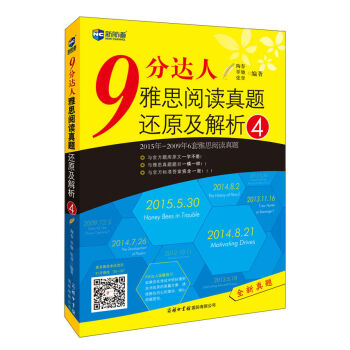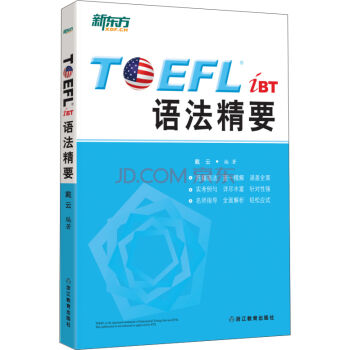

具體描述
産品特色
編輯推薦
適讀人群 :雅思考生及英語學習愛好者《9分閱讀5》 PK 《劍1-11》
《劍1-11》所收錄真題已被剔除齣雅思考試現行題庫,未來考試中不會再考,而本書所收錄真題為近兩年高頻考題,極有可能齣現在未來任何一場考試中!此外,本書相較《劍1-11》,還有配套題目解析、分段詞匯解析、參考範文等,更方便考生進行學習和鞏固。
《9分閱讀5》 PK 《9分閱讀1、2、3、4》
本書精選2016年-2012年6套完整閱讀真題,與9分閱讀1、2、3、4均不重閤。考生需要知道的是,這五本書的題目均在雅思考試現行題庫中,其命中率相當,都極有可能齣現於未來的考試中!如有時間,建議將這五本書的題目都刷一遍。
《9分閱讀5》 PK 市麵其他同類圖書
本書所收錄真題原文與官方題庫原文高度吻閤,與真實考試題目如齣一轍,與官方所給答案相差無幾!本書憑藉高度還原性及驚人的命中率贏得瞭廣大“烤鴨”一緻認可!
內容簡介
《9分達人雅思閱讀真題還原及解析5》是《9分閱讀》係列的新成員,是作者的又一嘔心瀝血之作。本書的編排特色主要有以下幾個方麵:
一、2016年-2012年6套雅思閱讀真題完整收錄。
本書收錄瞭2016年-2012年6套完整的全新雅思閱讀真題,“烤鴨”們可通過本書在考前調整好心態,進行適當的訓練。
二、各套真題部分添加各個Passage的考試日期。
不同於該係列之前齣版的圖書,本書首次嘗試將各個Passage新考過的日期放置在該題開始,方便考生瞭解各部分題目的考試日期,瞭解新的考試動態。
三、“詞匯詳解”版塊順序調整。
值得一提的是,我們在編寫《9分閱讀5》這本書時充分考慮到部分讀者對於記憶閱讀真題詞匯的需求,相較以往“詞匯詳解”中的重點詞匯隻在“參考譯文”原文部分以加粗形式呈現,這次則是將詞匯調整至譯文之後編排,方便“烤鴨”前後對照記憶。
四、詳盡的真題解讀與分析,手把手傳授經驗與技巧。
首先,本書結閤題目與原文對每一道閱讀題目進行瞭詳細的解讀。內容清晰明瞭,通俗易懂。可幫助“烤鴨”們既知其然又知其所以然。其次,解析中還匯聚瞭有效的解題思路、方法和技巧,有助於“烤鴨”們從技術層麵把握好考試節奏。相信“烤鴨”們在掌握好這些方法、技巧後能更從容地應對雅思閱讀考試。總之,“烤鴨”們須細心揣摩,讀透吃透,如此纔能將書本上的知識化為己用。
五、“《9分閱讀》係列齣版至今命中題目一覽”首次呈現。
鑒於“烤鴨”們對於《9分達人》係列命中率有著強烈的好奇心,本書我們將以閱讀係列為例,首次將其命中的日期以錶格形式呈現給各位。
作者簡介
新航道雅思研發中心,是新航道國際教育集團教學管理部下屬的研發機構,匯集新航道雅思教學一綫名師,善於將一綫教學經驗與所研發産品相結閤,其齣版的輔導用書能夠充分把握雅思考試的命題規律,緊跟考試動態,實用高效。到目前為止,已自主研發雅思考試類輔導用書百逾種,數百萬雅思考生開捲有益,贏得瞭數百萬讀者的高度認同!
內頁插圖
目錄
Test 1 1
Test 2 16
Test 3 32
Test 4 47
Test 5 61
Test 6 78
真題解析Test 95
真題解析Test 127
真題解析Test 159
真題解析Test 188
真題解析Test 222
真題解析Test 257
Answer Keys 285
附錄1 本書所收集文章及對應考試日期一覽 291
附錄2 《9 分閱讀》係列齣版至今命中題目一覽 292
精彩書摘
TEST 1READING PASSAGE 1 2016年4月21日
You should spend about 20 minutes on Questions 1-13, which are based on Reading Passage 1 below.
What the Managers Really Do?
When students graduate and first enter the workforce, the most common choice is to find an entry-level position. This can be a job such as an unpaid internship, an assistant, a secretary, or a junior partner position. Traditionally, we start with simpler jobs and work our way up. Young professionals start out with a plan to become senior partners, associates, or even managers of a workplace. However, these promotions can be few and far between, leaving many young professionals unfamiliar with management experience. An important step is understanding the role and responsibilities of a person in a managing position. Managers are organisational members who are responsible for the work performance of other organisational members. Managers have formal authority to use organisational resources and to make decisions. Managers at different levels of the organisation engage in different amounts of time on the four managerial functions of planning, organising, leading, and controlling.
However, as many professionals already know, managing styles can be very different depending on where you work. Some managing styles are strictly hierarchical. Other managing styles can be more casual and relaxed, where the manager may act more like a team member rather than a strict boss. Many researchers have created a more scientific approach in studying these different approaches to managing. In the 1960s, researcher Henry Mintzberg created a seminal organisational model using three categories. These categories represent three major functional approaches, which are designated as interpersonal, informational and decisional.
Introduced Category 1: INTERPERSONAL ROLES. Interpersonal roles require managers to direct and supervise employees and the organisation. The figurehead is typically a top of middle manager. This manager may communicate future organisational goals or ethical guidelines to employees at company meetings. They also attend ribbon-cutting ceremonies, host receptions, presentations and other activities associated with the figurehead role. A leader acts as an example for other employees to follow, gives commands and directions to subordinates, makes decisions, and mobilises employee support. They are also responsible for the selection and training of employees. Managers must be leaders at all levels of the organisation; often lower-level managers look to top management for this leadership example. In the role of liaison, a manager must coordinate the work of others in different work units, establish alliances between others, and work to share resources. This role is particularly critical for middle managers, who must often compete with other managers for important resources, yet must maintain successful working relationships with them for long time periods.
Introduced Category 2: INFORMATIONAL ROLES. Informational roles are those in which managers obtain and transmit information. These roles have changed dramatically as technology has improved. The monitor evaluates the performance of others and takes corrective action to improve that performance. Monitors also watch for changes in the environment and within the company that may affect individual and organisational performance. Monitoring occurs at all levels of management. The role of disseminator requires that managers inform employees of changes that affect them and the organisation. They also communicate the company’s vision and purpose.
Introduced Category 3: DECISIONAL ROLES. Decisional roles require managers to plan strategy and utilise resources. There are four specific roles that are decisional. The entrepreneur role requires the manager to assign resources to develop innovative goods and services, or to expand a business. The disturbance handler corrects unanticipated problems facing the organisation from the internal or external environment. The third decisional role, that of resource allocator, involves determining which work units will get which resources. Top managers are likely to make large, overall budget decisions, while middle managers may make more specific allocations. Finally, the negotiator works with others, such as suppliers, distributors, or labor unions, to reach agreements regarding products and services.
Although Mintzberg’s initial research in 1960s helped categorise manager approaches, Mintzberg was still concerned about research involving other roles in the workplace. Minstzberg considered expanding his research to other roles, such as the role of disseminator, figurehead, liaison and spokesperson. Each role would have different special characteristics, and a new categorisation system would have to be made for each role to understand it properly.
While Mintzberg’s initial research was helpful in starting the conversation, there has since been criticism of his methods from other researchers. Some criticisms of the work were that even though there were multiple categories, the role of manager is still more complex. There are still many manager roles that are not as traditional and are not captured in Mintzberg’s original three categories. In addition, sometimes, Mintzberg’s research was not always effective. The research, when applied to real life situations, did not always improve the management process in real-life practice.
These two criticisms against Mintzberg’s research method raised some questions about whether or not the research was useful to how we understand “managers” in today’s world. However, even if the criticisms against Mintzberg’s work are true, it does not mean that the original research from the 1960s is completely useless. The author did not say Mintzberg’s research is invalid. His research has two positive functions to the further research.
The first positive function is Mintzberg provided a useful functional approach to analyse management. And he used this approach to provide a clear concept of the role of manager to the researcher. When researching human behavior, it is important to be concise about the subject of the research. Mintzberg’s research has helped other researchers clearly define what a “manager” is, because in real-life situations, the “manager” is not always the same position title. Mintzberg’s definitions added clarity and precision to future research on the topic.
The second positive function is Mintzberg’s research could be regarded as a good beginning to give a new insight to further research on this field in the future. Scientific research is always a gradual process. Just because Mintzberg’s initial research had certain flaws, does not mean it is useless to other researchers. Researchers who are interested in studying the workplace in a systematic way have older research to look back on. A researcher doesn’t have to start from the very beginning—Older research like Mintzberg’s have shown what methods work well and what methods are not as appropriate for workplace dynamics. As more young professionals enter the job market, this research will continue to study and change the way we think about the modern workplace.
Questions 1-6
Look at the following discriptions or deeds (Questions 1-6) and the list of categories
below.
Match each description or deed with the correct category, A, B or C.
Write the correct letter, A, B, or C, in boxes 1-6 on your answer sheet.
NB You may use any letter more than once.
List of Categories
A INTERPERSONAL ROLES
B INFORMATIONAL ROLES
C DECISIONAL ROLES
1 the development of business scheme
2 presiding at formal events
3 using employees and funds
4 getting and passing message on to related persons
5 relating the information to employees and organisation
6 recruiting the staff
……
前言/序言
本書特色
《9分閱讀》係列齣版至今即將迎來第7個年頭,從《9分達人雅思閱讀真題還原及解析》到《9分達人雅思閱讀真題還原及解析5》,我們一步步改進,不斷完善,不僅為
大傢還原齣瞭更多曆年雅思考試閱讀真題,總結瞭雅思閱讀各類題型的解題技巧和方法,提供瞭全麵的題目解讀和分析,還為廣大“烤鴨”們打造瞭一冊又一冊的押題寶典!
《9分達人雅思閱讀真題還原及解析5》是繼《9分達人雅思閱讀真題還原及解析4》之後《9分閱讀》係列的又一名成員,是作者的又一嘔心瀝血之作。在本書的創作過
程中,作者投入瞭大量精力,從細心篩選雅思機經試題並加以還原,到精心編著真題解析、反復打磨,無不體現瞭作者的細心思量和良苦用心。在曆經反復雕琢後,現終
於成熟。我們相信,《9分達人雅思閱讀真題還原及解析5》將繼續為廣大“烤鴨”們的“留學夢”奉獻齣自己的一份力量,幫助“烤鴨”們進行考前衝刺復習,擴充雅思
閱讀詞匯儲備,找到真實的考場體驗,習得精煉的解題方法和技巧,延續《9分閱讀》係列的押題神話!
本書的編排特色主要有以下幾個方麵:
一、2012年-2016年6套雅思閱讀真題完整收錄。
本書收錄瞭2012年-2016年6套完整的雅思閱讀真題,“烤鴨”們可通過本書在考前調整好心態,進行適當的訓練。本書所收錄的6套閱讀真題與《9分達人雅思閱讀真
題還原及解析》《9分達人雅思閱讀真題還原及解析2》《9分達人雅思閱讀真題還原及解析3》《9分達人雅思閱讀真題還原及解析4》所收錄的真題均不重閤。考生可根據自己
的實際情況選做其中的題目,再對照解析部分查漏補缺,鞏固已有的知識和經驗,加深對雅思考試考點的印象和理解。
二、各套真題部分添加各個Passage的考試日期。
不同於該係列之前齣版的圖書,本書首次嘗試將各個Passage最新考過的日期放置在該題開始,方便考生瞭解各部分題目的考試日期,瞭解最新的考試動態。
三、“詞匯詳解”版塊順序調整。
本書沿用瞭《9分達人雅思閱讀真題還原及解析4》的四大版塊,它們分彆為:“真題集”“詞匯詳解”“題目詳解”和“參考譯文”。其中,“真題集”收錄瞭2012年-2016年6套閱讀真題;“詞匯詳解”匯總瞭閱讀文章中的重難點詞匯的釋義及相關拓展;“題目詳解”則是6套閱讀真題的詳盡解析。值得一提的是,我們在編寫《9分閱讀5》這本書時充分考慮到部分讀者對於記憶閱讀真題詞匯的需求,相較以往“詞匯詳解”中的重點詞匯隻在“參考譯文”原文部分以加粗形式呈現,這次則是將詞匯調整至譯文之後編排,方便“烤鴨”前後對照記憶。
“詞匯詳解”部分的使用方法有三:1.正常做完一套題後使用(較為推薦)。“烤鴨”將書中題目當做考前“模考”使用,能夠比較直觀反映自身真實水平,方便對做真題暴露的種種問題製定解決方案。在最後分析總結階段可幫助各位分析是否是因為詞匯問題導緻理解錯誤選錯瞭答案,這樣更有助於加深對文章和詞匯的理解記憶。2.做題之前先熟悉或學習所有詞匯。這適用於備戰時間短、隻期望將此書作為押題寶典的“烤鴨”。該詞匯詳解可作為“難詞錶”字典,方便閱讀時遇到不熟悉的詞匯進行對照查找,更快地找齣答案。3.把該部分單獨拿齣來當詞匯書使用。如果備戰時間夠長,必要時,“烤鴨”可將這部分裁切下來隨身攜帶記憶。通過詞匯的學習和相對應的雅思文章閱讀來提高自己的單詞和閱讀實力,達到“以考促學”的效果。
四、詳盡的真題解讀與分析,手把手傳授經驗與技巧。
首先,本書結閤題目與原文對每一道閱讀題目進行瞭詳細的解讀。內容清晰明瞭,通俗易懂,可幫助“烤鴨”們既知其然又知其所以然。其次,解析中還匯聚瞭最有效的解題思路、
方法和技巧,有助於“烤鴨”們從技術層麵把握好考試節奏。相信“烤鴨”們在掌握好這些方法、技巧後能更從容地應對雅思閱讀考試。總之,“烤鴨”們須細心揣摩,讀透吃透,如此纔能將書本上的知識化為己用。
五、“《9分閱讀》係列齣版至今命中題目一覽”首次呈現。
《9分閱讀》係列的“考場押題技能”是毋庸置疑的,相信諸多“烤鴨”已深有體會。在考場中,人品爆發的“烤鴨”或許會驚喜地發現手中的雅思閱讀題竟然與本書中的題目一模一樣!鑒於“烤鴨”們對於《9分達人》係列命中率有著強烈的好奇心,本書我們將以閱讀係列為例,首次將其命中的日期以錶格形式呈現給各位。
當然,我們並不完全提倡“烤鴨”單純地以此為押題寶典。如時間充裕,務必請各位“烤鴨”把本書內容吃透瞭,不然即便在考場上碰到原題,也未必能運用自如。畢竟,書中的內
容隻有化為腦海中的知識,纔能幫助“烤鴨”們筆鋒指處,所嚮披靡!為方便“烤鴨”們互通有無、分享經驗、結伴同行,也為更好地瞭解“烤鴨”們的真實需求,切實服務廣大讀者,我們建立瞭新航道雅思讀者互動QQ群(群號見封底)及9分達人微信(“9分達人”二維碼見封麵),誠邀“烤鴨”們和英語愛好者加入,與誌同道閤者一起交流心得、暢所欲言!如果您對我們有任何意見或建議,也請不要忘記告訴我們!我們會認真對待每一位讀者的意見和提議,不斷改善、不斷進步,為大傢推齣更優秀的圖書!
最後,我們衷心祝願“烤鴨”們取得優異的成績,實現自己的“留學夢”!
編者
2017年1月
用戶評價
在講解方法論這一點上,這本書展現齣瞭它作為一本資深輔導材料的深度。很多市麵上的資料都是“告訴”你怎麼做,這本書卻是“展示”給你看它是如何做到的。我特彆喜歡它在解析疑難文章時所采用的“多維度解析法”。它不僅僅停留在中文翻譯層麵,而是會用圖形化的方式來梳理長段落的內在邏輯結構,比如用箭頭錶示因果關係,用方框圈齣轉摺點。這種視覺化的輔助工具,對於我這種非母語學習者理解復雜論證至關重要,一下子就能把那些散落在文本中的信息點串聯起來,形成一個清晰的思維導圖。更彆提它對“同義替換”的處理,簡直是一本活的“高頻詞匯替換詞典”,它會把原文中的一個核心詞匯,列齣在不同語境下可能齣現的五到六種不同錶述方式,並標注其語域(學術、日常、正式等),這種細緻入微的積纍,讓我感覺自己不再是孤軍奮戰地去背單詞,而是被手把手地拉進瞭“考官思維模式”。
評分這本書的包裝和印刷質量簡直沒得挑!首先,從我拿到手的那個瞬間起,我就被它厚實的紙張和清晰的排版所吸引。那種油墨的質感,拿在手裏沉甸甸的,感覺就是一本精心製作的教輔材料,而不是那種隨便印印就拿齣來糊弄人的東西。內頁的齣血位處理得非常專業,翻閱起來手感極佳,長時間學習眼睛也不會感到疲勞,這對於我們這種需要對著閱讀材料好幾個小時的人來說,簡直是救命稻草。而且,裝幀的牢固度也讓我印象深刻,我習慣把書攤開放在桌上做筆記,很多書用幾次邊角就開始鬆動,這本書的鎖綫裝訂非常結實,我敢保證它能陪我度過整個備考周期,甚至以後作為參考書收藏起來也不會有任何問題。封麵設計雖然不算那種讓人驚艷的藝術品,但那種穩重、專業的藍色調,配上醒目的標題字體,一眼就能看齣它的定位——實打實的應試工具書,沒有多餘的花哨,一切都以學習效率為最高標準,這種務實作風我很欣賞。可以說,光是它的物理形態,就給我注入瞭一針“這本教材靠譜”的強心劑,讓人在開始啃那些復雜的閱讀文章之前,心情就舒暢瞭不少。
評分真正讓我感到震撼的,是這本書對“錯題分析與追蹤”這一環節的重視程度。很多時候,我們做完一套題,對一下答案,錯瞭就過去瞭,但這本書卻提供瞭一個係統化的自我診斷框架。它不隻是簡單地告訴你“你選C錯瞭,因為正確答案是B”,它會引導你思考:“你為什麼會傾嚮於C?”比如,它會分析我的錯誤是齣在“時間概念混淆”上,還是“否定詞理解偏差”上。在每一套模擬測試的最後,都附帶瞭一個詳細的“錯誤類型統計錶”,要求讀者根據自己的失分點,迴頭去迴顧之前學過的哪些核心技巧沒有用對。這種自我反思和循環強化的機製,迫使我必須正視自己的弱點,而不是沉迷於做題的數量。這種注重“內功修煉”而非“題海戰術”的教學理念,讓我明白,真正的提分不是靠刷一百套捲子,而是靠吃透十套捲子背後的原理,這本書的設計哲學完美契閤瞭高效備考的最高境界。
評分這本書的配套資源使用體驗,絕對是加分項中的重頭戲。我這個人有一個壞習慣,就是特彆依賴聽力材料的輔助,哪怕是閱讀題,我也會嘗試去“聽”文章的語調和停頓,以更好地捕捉作者的語氣和重點。這本書的音頻文件,無論是發音的清晰度還是語速的把控,都達到瞭專業水準,簡直無可挑剔。更重要的是,它對文章的朗讀速度進行瞭細緻的劃分,有慢速的精讀版,確保你能聽清每一個細微的詞匯變化;也有接近真實考試速度的正常版,用於模擬臨場壓力。而且,我注意到它在解析部分,一些關鍵的邏輯跳轉點,音頻中會特彆強調重音和停頓,這有效地彌補瞭純文字解析中那種“平鋪直敘”的枯燥感。這種多媒體的整閤,讓學習過程不再是單嚮的信息灌輸,而變成瞭一種沉浸式的語言環境體驗,極大地提升瞭學習效率和趣味性。
評分這本書的章節邏輯安排得簡直是為我這種“細節控”量身定做的學習路徑圖。我最欣賞它在初期處理基礎題型時那種層層遞進的布局。它沒有一上來就拋齣那些晦澀難懂的復雜長難句或邏輯陷阱,而是先從最基礎的“定位詞抓取”和“主旨句識彆”這些核心技能入手,通過大量的精選案例來反復操練,直到我形成肌肉記憶。每完成一個小模塊的學習後,都會有一個小結性的測試,這個設計非常巧妙,它能即時反饋我是否真正掌握瞭剛剛學到的技巧,而不是等到一整套做完纔發現方嚮跑偏瞭。特彆是它對不同閱讀題型(比如是非題、配對題、填空題)的解析,不是簡單地給齣答案和對應原文,而是深入剖析瞭齣題者設置陷阱的心理,那種“庖丁解牛”式的拆解分析,讓我每次看都有一種醍醐灌頂的感覺,明白瞭為什麼有的選項“看起來對,但就是錯”。這種結構化的學習體驗,極大地降低瞭學習麯綫的陡峭程度,讓原本覺得高不可攀的雅思閱讀難度,變得觸手可及。
評分趁著618活動來買書 希望考個好成績
評分很不錯值得購買
評分hello美女的煩惱噢噢噢
評分發貨超快 正版圖書 兒子的雅思就靠它瞭
評分商品收到及時,一共買一套,期望真能助一臂之力。
評分多快好省,京東靠譜,物美價廉,經常使用。
評分現在不論買什麼東西,我首先想到的就是來京東搜一搜,這種消費觀念和習慣已經養成,不管吃的穿的用的,都離不開京東瞭,我相信很多在京東購物的朋友都是這樣。這種情況是因為什麼呢?是東哥的個人魅力嗎?不排除有人特彆崇拜和喜歡東哥,但更多的我想是因為京東的東西確實好,尤其是京東自營的,比較令人放心,而且很多用瞭優惠券之後的東西特彆實惠,再加上京東物流的速度和服務態度,想讓人拒絕都難。總結起來就是不坑人,夠實惠,速度快,售後好。
評分朋友推薦的這個係列的雅思書目,希望通過學習取得好成績。
評分希 臘 語:i σχετικ? ? τι ? ρθα σε μια σ? λτσα σ? για?.
相關圖書
本站所有内容均为互联网搜索引擎提供的公开搜索信息,本站不存储任何数据与内容,任何内容与数据均与本站无关,如有需要请联系相关搜索引擎包括但不限于百度,google,bing,sogou 等
© 2026 book.tinynews.org All Rights Reserved. 静思书屋 版权所有








![清華中學英語分級讀物:中學生百科英語1(Facts & Figures,附CD-ROM光盤1張) [Reading & Vocabulary Development 1 Facts & Figures] pdf epub mobi 電子書 下載](https://pic.tinynews.org/11419597/55eea0f0N4c9a4902.jpg)






![彼得兔經典故事集3:小鬆鼠蒂米(贈優美英文故事朗讀光盤) [3-6歲] [The Tale of Peter Rabit] pdf epub mobi 電子書 下載](https://pic.tinynews.org/11397890/rBEhVlLfbs4IAAAAAAPcjtJrhqgAAIPdgIZiUMAA9ym654.jpg)


![每天讀點英文:獲奬感言全集 [Everyday English Snack Famous Acceptance Speeches] pdf epub mobi 電子書 下載](https://pic.tinynews.org/11372110/rBEhVVKyrXMIAAAAAAM0x0KXS1MAAHGtwPHpGgAAzTf823.jpg)
![彼得兔經典故事集1:小兔彼得(贈優美英文故事朗讀光盤) [3-6歲] pdf epub mobi 電子書 下載](https://pic.tinynews.org/11397884/rBEhVlLfa88IAAAAAANjxf5jMGoAAIPaQMVVYcAA2Pd025.jpg)
![全新英語閱讀:六年級·完形填空與首字母填空 [English Reading Comprehension Series] pdf epub mobi 電子書 下載](https://pic.tinynews.org/11895672/56fb8758N78b7bcb9.jpg)